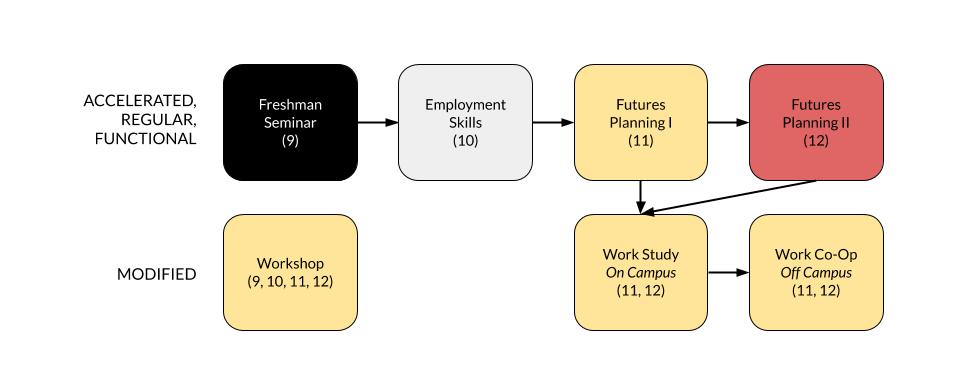
Accelerated, Regular & Functional
Employment Skills Grade: 10 Credit: .5 Length: Semester
Required
Content: The course will focus on work values; finding a job; getting help in searching for your job; applying for a job; personal job preferences; skills, qualifications and training; interviewing; portfolios and/or resumes; and keeping the job.
Future Planning I Grade: 11 Credit: .5 Length: Semester
Required
Content: Juniors will complete career interest inventories, fill out an online application for DVR services/contacts, go on campus visits to nearby colleges, have guest speakers from several different agencies in classroom, cover the importance of the college costs and admissions requirements, do the ACT practice test and the actual ACT test in March, discuss topics from the “Being 18” booklet, discuss the living arrangements after graduation, attend the bi-annual College Fair, and emphasize their current high school grades, extra-curricular activities and GPA for colleges, vocational programming and employment. We will also cover post-secondary employment, self advocacy, living independently and Social Security benefits.
Future Planning II Grade: 12 Credit: .5 Length: Full Year Equivalent
Required
Content: Seniors will go over the similar topics from the Future Planning I but with more emphasis on college applications and sending them out to the desired colleges, scholarships- on the internet and paper applications, and the differences in grants, scholarships and loans. Follow up with the Division of Vocational Rehabilitation (DVR), employment opportunities and connections with post secondary resources like the Aging and Disability Resource Center (ADRC), independent living centers and other agencies that may be able to assist the student after graduation. Students who are seeking employment after graduation will focus heavily on job shadowing and seeking employment services in combination with DVR. This course also includes the awareness and action for post-secondary employment and living arrangements.
Work Study Grade: 11/12 Credit: .5-1.0 Length: Semester/Year
Prerequisites: Employment Skills; Students are limited to one semester of work study during high school; Instructor and/or Principal approval for more than one semester during high school is needed
Content: This course will also require satisfactory completion of the book course, Employment Skills, whenever it does precede the Work Experience course or approval of the principal. The course is intended to give credits toward graduation and/or minimum wage pay to students working at least 40 minute slots or more. The time element requires that this to be done through employment on campus. The student learns how to apply for a job submitting seven application forms plus necessary documents and how to relate to an employer while getting support from a job coach. Rather than being a step towards a particular career, it is an opportunity to learn and adjust to a regular work schedule with set expectations. It is a chance to learn to problem-solve on the job. It also develops responsibility and good habits regarding timeliness, attendance and reporting of hours worked. It allows students to feel good about themselves, as well, by being a productive part of the team.
Modified
Work Study Grade: 11/12 Credit: .5-1.0 Length: Semester/Year
Prerequisites: Employment Skills; Students are limited to one semester of work study during high school; Instructor and/or Principal approval for more than one semester during high school is needed
Content: This course will also require satisfactory completion of the book course, Employment Skills, whenever it does precede the Work Experience course or approval of the principal. The course is intended to give credits toward graduation and/or minimum wage pay to students working at least 40 minute slots or more. The time element requires that this to be done through employment on campus. The student learns how to apply for a job submitting seven application forms plus necessary documents and how to relate to an employer while getting support from a job coach. Rather than being a step towards a particular career, it is an opportunity to learn and adjust to a regular work schedule with set expectations. It is a chance to learn to problem-solve on the job. It also develops responsibility and good habits regarding timeliness, attendance and reporting of hours worked. It allows students to feel good about themselves, as well, by being a productive part of the team.
Workshop Grade: 9/10/11/12 Credit: .5-1.0 Length: Year
Content: Students will focus on developing work skills. A variety of on campus work experiences are provided such as recycling, small assembly and sorting tasks, shredding, labeling, folding and stuffing mailings. Students work on attending to task, maintain a steady work rate, working with and without direct supervision, following directions and asking for help when assistance is needed.
